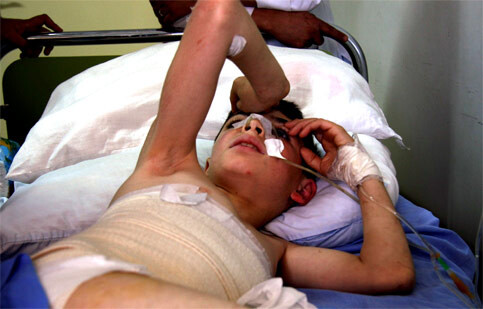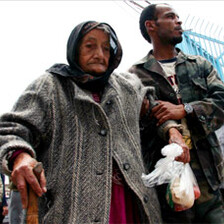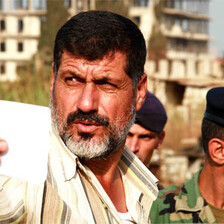Electronic Lebanon 24 May 2007

Yousef Abu Radi, 12, was hit by shrapnel when a civilian bus fleeing Nahr al-Bared came under fire. His mother died in the incident. (Hugh Macleod/IRIN)
NAHR AL-BARED, 24 May 2007 (IRIN) - Yousef Abu Radi, 12, was hit by shrapnel when a civilian bus fleeing Nahr al-Bared, a Palestinian refugee camp in north Lebanon, came under fire on Wednesday afternoon.
Dozens of civilians have been killed in five days of fighting between the Lebanese army and Fatah al-Islam, a radical Islamist group based in the camp. At least 50 soldiers and militants have also been killed.
With up to 40,000 civilians living in the camp, questions are being raised as to whether the Lebanese army’s response to the militants has been in contravention of international humanitarian law.
“We heard news on Tuesday that we could leave so at about four in the afternoon we were trying to get out of the camp. There was a bus to take us, but at first its engine wouldn’t start — for three times, I remember. Some people said it was God’s sign that we weren’t supposed to leave.
“I was in the bus with my mother, father and two sisters and one other family. We were only about 50 metres from the Lebanese army checkpoint when the bus came under fire. I remember seeing the driver die from flying shrapnel in his chest and head. Then I saw that my mother had been hit and was bleeding.
“We were all screaming and I was trying to protect my sister from the bullets. I had her wrapped in my arms. That’s when I felt the pain in my back and in my stomach and realised I had been hit by something.
“We crawled out of the bus and I remember the Lebanese soldiers shouting that we might have some money or gold they could take from us.
“A family we knew carried me and my mother and father into a Mercedes car and drove us to hospital. We left my sisters Jinan and Jana, who is two years old, with friends. On the way to the hospital I realised that my mother had died. My little sister doesn’t know yet.”
This item comes to you via IRIN, a UN humanitarian news and information service, but may not necessarily reflect the views of the United Nations or its agencies. All IRIN material may be reposted or reprinted free-of-charge; refer to the copyright page for conditions of use. IRIN is a project of the UN Office for the Coordination of Humanitarian Affairs.
Related Links


